
ElevenLabs: AI Voice Generation Platform
ElevenLabs is pioneering the realm of AI-powered Text to Speech and Voice Generation. This platform is designed to create the most realistic speech output by leveraging advanced AI audio technology.
ElevenLabs is at the forefront, driving innovation in the field of AI-powered text to speech (TTS) and voice generation technologies. This platform is distinguished by its ability to produce exceptionally realistic and natural-sounding audio from text inputs, setting a new benchmark in synthetic voice quality. Here’s a deeper dive into what sets ElevenLabs apart and how it serves as a pivotal tool in the evolution of voice tech
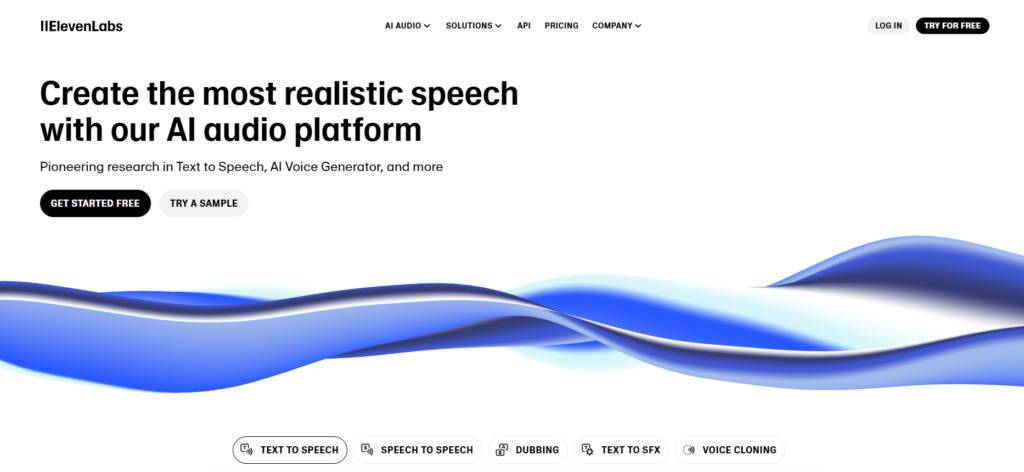
Features of this tool
ElevenLabs’ AI Voice Generation Platform stands out due to a suite of innovative features that push the boundaries of text-to-speech (TTS) and voice generation technology. These features enable highly realistic, customizable, and versatile audio content production. Here’s a closer look at some key features:
1. High-Quality Voice Generation
- Realistic Speech Output: Generates voices that are remarkably lifelike, eliminating the artificial tone often found in traditional TTS systems. This realism enhances listener engagement across various content types.
2. Voice Cloning
- Rapid Voice Cloning: Can clone any voice from a relatively small audio sample, allowing users to generate speech in the voice of specific individuals. This has vast implications for personalized content, accessibility, and entertainment.
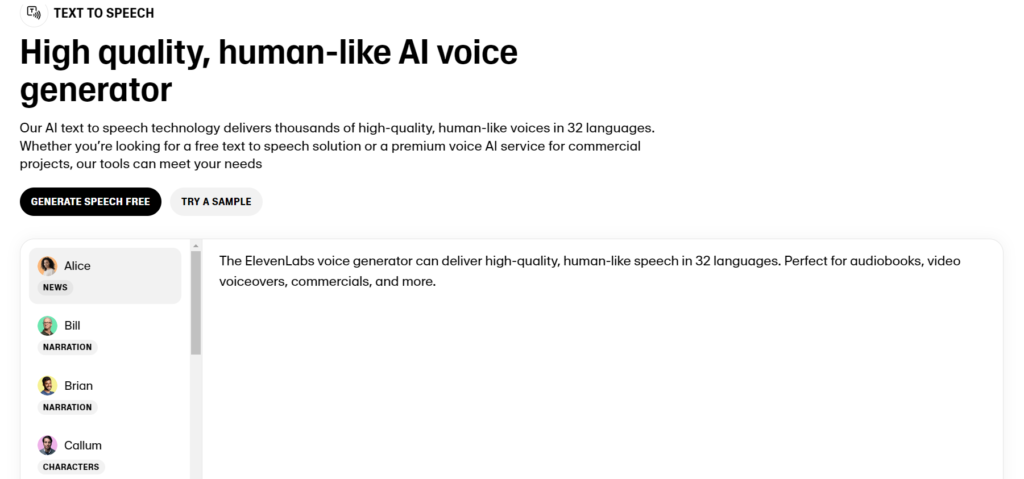
3. Extensive Customization Options
- Adjustable Parameters: Offers customization options like pitch, speed, and emotional tone to match the intended messaging or content needs, allowing for dynamic and expressive audio outputs.
4. Multilingual Support
- Language Diversity: Supports multiple languages and dialects, making it an invaluable tool for creating global content and reaching a wider audience without the barrier of language.
5. Emotion and Expressiveness
- Conveying Emotion: The platform can infuse synthetic speech with various emotional undertones, such as happiness, sadness, or anger, enhancing the realism and impact of the spoken word.
6. Accessible Content Creation
- Ease of Use: Designed to be user-friendly, allowing content creators, educators, and businesses to effortlessly convert text into natural-sounding speech without the need for technical expertise in AI or audio production.
7. Scalability and Efficiency
- Time and Cost Savings: Streamlines the production of voice content, significantly reducing the need for human voice actors for every project and enabling rapid scaling of content creation across different formats.
8. Ethical Use and Privacy
- Secure and Ethical: Emphasizes responsible use, especially concerning voice cloning, to prevent misuse. Implements measures to protect privacy and ensure the technology is used ethically, fostering trust among users.
9. Wide Application Range
- From audiobooks, podcasts, educational materials, and accessibility solutions to enhancing virtual assistants, gaming experiences, and personalized voice notifications, the platform’s versatility covers a broad spectrum of use cases.
10. Cloud-Based Platform
- Accessibility and Integration: Being cloud-based, it offers easy access and integration with other services, allowing for seamless workflow integration and collaboration across different projects and platforms.
Usecases of this tool
The AI Voice Generation Platform from ElevenLabs offers broad versatility, applicable across numerous industries and use cases. Here’s a detailed look at the various scenarios where this tool can be optimally utilized:
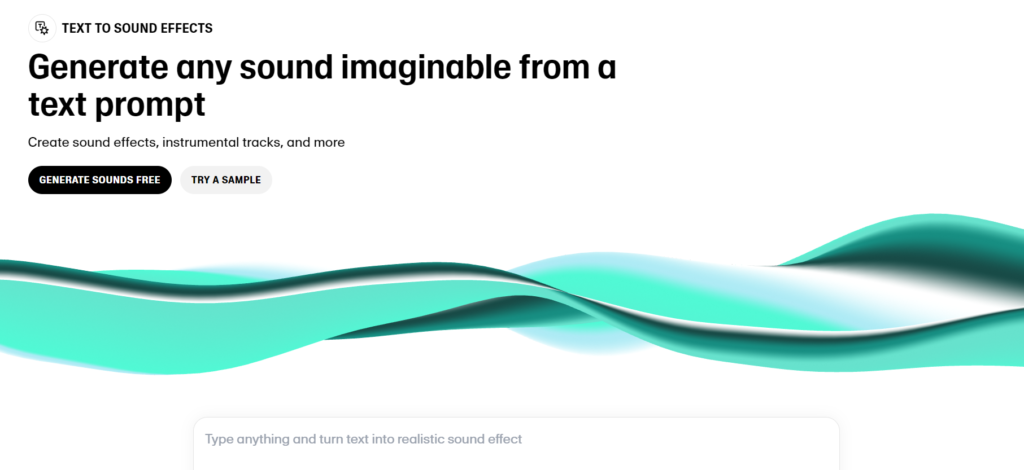
1. Audiobook Production
- Narration: Convert written content into engaging audio books, using realistic voices without the continual need for human narrators.
2. E-Learning and Education
- Accessible Learning Materials: Create educational content that can speak to the student, making learning more interactive and accessible, especially for those with reading difficulties or visual impairments.
3. Entertainment and Media
- Dubbing: Seamlessly dub films and series in multiple languages, maintaining voice consistency and emotional tone without extensive casts of voice actors.
- Video Games: Generate dynamic character voices that can adapt to player interactions without extensive prerecorded dialogues.
4. Customer Service
- Interactive Voice Response (IVR) Systems: Improve customer experience with natural-sounding automated responses, guiding users through troubleshooting, information retrieval, and service navigation.
5. Corporate Training
- Training Modules: Develop engaging training modules with tailored voiceovers that are consistent in quality and easily updated or modified.
6. Healthcare
- Patient Assistance: Aid patients by providing voice-driven instructions and reminders for medication, appointments, and more, particularly helpful for those with impairments or the elderly.
7. Accessibility Features
- Assistive Technologies: Support individuals with disabilities by transforming written digital content into spoken word, improving the accessibility of websites, applications, and documents.
8. Personalized Marketing
- Voice Ads: Create personalized voice advertisements that can dynamically integrate the listener’s name or other personal details, enhancing engagement and connection.
9. Public Service Announcements
- Information Dissemination: Quickly deploy important information in multiple languages, essential for reaching diverse populations during emergencies or public health situations.
10. Virtual Assistants
- Home and Business Automation: Develop more natural and relatable voices for virtual assistants used in smart homes, offices, or customer service bots.
Competitors of this tool
Competitive alternatives to the AI Voice Generation Platform of ElevenLabs exist, each offering unique features and capabilities in the realm of voice synthesis and artificial intelligence. Here’s a breakdown of some notable competitors in the space:

1. Descript’s Overdub
- Overview: Descript Overdub allows users to create and edit synthetic voice clips based on their own voice or choose from a set of stock voices. It’s widely used in podcasting and video editing for adding voiceovers or correcting audio without re-recording.
- Key Features: Text-to-speech generation using personal voice models, integration with a broader audio/video editing suite.
2. WellSaid Labs
- Overview: WellSaid Labs offers highly lifelike text-to-speech voices, designed primarily for corporate training videos, educational content, and marketing media. They emphasize creating voices that are indistinguishable from real human speakers.
- Key Features: Wide range of avatars or voice styles, impressive clarity and naturalness, easy integration into production workflows.
3. IBM Watson Text to Speech
- Overview: IBM Watson’s Text to Speech service provides API access to convert written text into natural-sounding audio in various languages and voices. It’s geared towards enterprises needing automated voice generation for customer service, educational materials, and more.
- Key Features: Multiple languages and voices, expression and emotion support, extensive customization options.
4. Google Cloud Text-to-Speech
- Overview: Google Cloud Text-to-Speech enables developers to convert text into high-quality voice output powered by Google’s AI technologies. It supports a wide variety of languages and offers extensive options for customization.
- Key Features: Support for over 30 languages, WaveNet-powered voices for enhanced naturalness, integration with Google Cloud services.
5. Microsoft Azure Cognitive Services Text to Speech
- Overview: Part of the Azure suite of AI services, Microsoft’s offering allows for text-to-speech applications with realistic voices and fine-grained control over speech patterns and styles. It’s useful for developing interactive apps, customer service bots, and accessibility solutions.
- Key Features: Extensive customization, neural text-to-speech voices, support for various languages and dialects.
6. CereProc
- Overview: CereProc stands out for its characterful and emotional text-to-speech voices. It offers unique regional accents and has been noted for creating a synthetic voice for renowned personalities like Roger Ebert.
- Key Features: Highly characterful voices, customizable emotion and personality in speech, available for both personal and commercial use.
Comparision of this tool
Here, the comparative analysis will focus on key features like voice realism, customization options, languages supported, use cases, and pricing structure. This comparison will include some of the competitors mentioned previously, namely Descript’s Overdub, WellSaid Labs, IBM Watson Text to Speech, Google Cloud Text-to-Speech, and Microsoft Azure Cognitive Services Text to Speech.

Key Comparison Factors:
- Voice Realism:
- ElevenLabs: Known for generating highly realistic voice synthesis, enabling expressive and natural-sounding speech.
- Descript’s Overdub: Offers personalized voice cloning, with a strong focus on creating a user’s digital voice double for editing purposes.
- WellSaid Labs: Praised for their lifelike avatars that deliver exceptionally natural and clear speech.
- IBM Watson Text to Speech: Offers a range of voices with a good balance between naturalness and expressiveness.
- Google Cloud Text-to-Speech: Utilizes WaveNet technology for highly natural-sounding speech.
- Microsoft Azure Cognitive Services: Provides neural text-to-speech voices that are realistic and customizable.
- Customization and Control:
- ElevenLabs: Advanced customization options, including emotional tone and speech patterns.
- Descript’s Overdub: Primarily focuses on voice editing within the broader audio/video suite, allowing for personalized voice manipulation.
- WellSaid Labs: Limited by the selection of avatars, though each avatar offers distinctly natural voices.
- IBM Watson Text to Speech: Offers detailed customization options, including expression and tone.
- Google Cloud Text-to-Speech: High degree of customization, particularly with WaveNet voices.
- Microsoft Azure Cognitive Services: Extensive control over voice styles, emotion, and speaking styles.
- Languages Supported:
- ElevenLabs: Not explicitly mentioned; details would be needed for a direct comparison.
- Descript’s Overdub: Primarily English, with limited additional language support.
- WellSaid Labs: Mainly English, with a focus on variety within the language.
- IBM Watson Text to Speech: Supports multiple languages and dialects.
- Google Cloud Text-to-Speech: Offers over 30 languages, making it highly versatile for global applications.
- Microsoft Azure Cognitive Services: Supports various languages and dialects, similar to Google’s offering.
- Primary Use Cases:
- ElevenLabs: Suitable for content creators, gaming, film production, and virtual assistants.
- Descript’s Overdub: Ideal for podcasters, video creators, and anyone needing to correct or generate vocal content seamlessly.
- WellSaid Labs: Focuses on professional content like training materials, educational content, and corporate presentations.
- IBM Watson Text to Speech: Beneficial for enterprises needing voice for customer service automation, education, and accessibility.
- Google Cloud Text-to-Speech: Versatile use across web and mobile applications, IoT devices, and customer service bots.
- Microsoft Azure Cognitive Services: Similar to Google, with applications in app development, customer service, and accessibility enhancements.
- Pricing Structure:
- Pricing varies widely among these platforms, often depending on the volume of text processed or the number of voice synthesis minutes used. Many of these services offer a free tier or demo, with scalable pricing tiers based on usage.
About the company
Certainly! Based on the information you’ve provided from your scrape of the ElevenLabs website, here is a detailed overview of the company:
About ElevenLabs
ElevenLabs is a pioneering company in the field of artificial intelligence (AI) audio solutions. They specialize in creating highly realistic speech through their Text to Speech AI Voice Generator. The company’s platform is designed to offer a broad range of audio solutions that cater to various needs, including audiobooks, video voiceovers, commercials, and more.
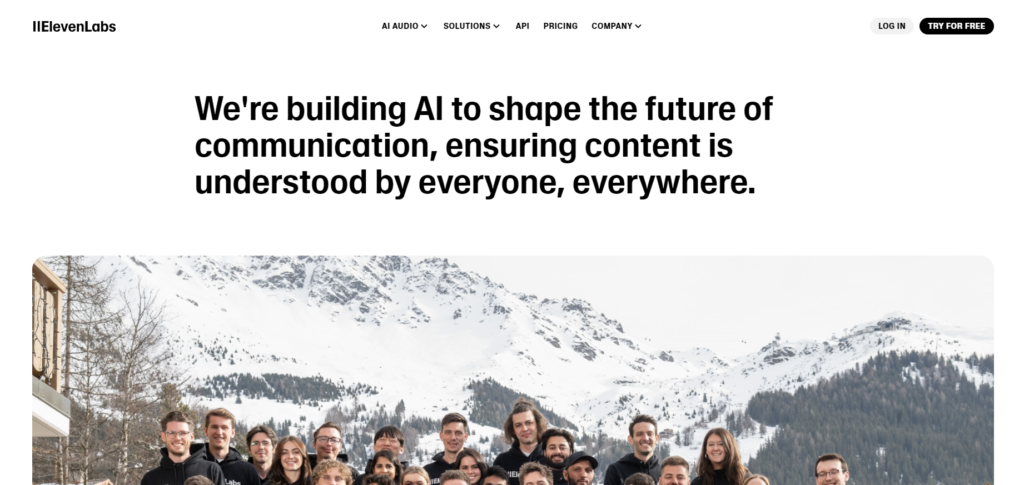
Achievements and Innovations:
- Multilingual AI Voice Technology: Demonstrated through partnerships and showcases, such as with NVIDIA ACE at COMPUTEX.
- Customer Success Stories: Various businesses and creators, including Cornell lecturers, Chess.com, HarperCollins Publishers, and best-selling authors have successfully leveraged ElevenLabs’ technology to enhance their audio content and reach.
- AI Safety and Ethics: Committed to building safe, reliable products that drive innovation and help overcome communication barriers.
Future Directions:
ElevenLabs continues to expand its impact and offerings, as indicated by:
- Launching new features and tools aimed at improving the efficiency and effectiveness of audio content creation.
- Strategic partnerships for expanding the usability and reach of their technology across different markets and use cases.
- An emphasis on research and development to keep advancing in the field of AI-audio solutions.
Company Presence:
- The company has showcased significant growth and innovation, indicating a strong presence in the AI audio market.
- They have recently established a European HQ in London, emphasizing their global operational focus.
Pros & Cons
Pros:
- Highly Realistic Voice Generation: Offers state-of-the-art AI that can produce highly realistic and natural-sounding voices, which can significantly improve user engagement and the overall listening experience.
- Custom Voice Cloning: The ability to clone voices adds a personalized touch to various applications, including gaming, virtual assistants, and personalized audio content, enhancing user experience.
- Multilingual and Diverse Voices: Supports a wide range of languages and accents, making it versatile and suitable for global applications, from audiobooks to multimedia content in several languages.
- Accessibility Enhancements: This technology can play a key role in making digital content more accessible to people with disabilities, including those who are visually impaired or have reading difficulties.
- Versatile Applications: Can be utilized across various industries, including entertainment, education, and customer service, to create a more immersive and engaging audio experience.
- Ethical Use of Technology: The company underscores a commitment to ethical practices and safety in AI, aiming to ensure the responsible use of voice cloning technology.
Cons:
- Potential for Misuse: Despite ethical commitments, the technology’s capability to clone voices could lead to misuse, such as creating deepfakes or impersonating individuals without consent.
- Quality Variation: While many reports suggest high quality, certain nuances and emotional inflections might be challenging to capture fully, which can vary the effectiveness depending on the use case.
- Technical Complexity: Setting up and optimizing AI voice generation or cloning to achieve desired results might require a learning curve or technical know-how, which could be a barrier for some users.
- Cost Factors: For businesses and individual creators, the cost of access to advanced features and technologies might be a consideration, especially for small-scale projects or those with limited budgets.
- Dependency on Digital Infrastructure: Effective use relies on having adequate digital infrastructure, which could limit accessibility in regions with poor internet connectivity or technological resources.
- Ethical and Privacy Concerns: The collection and use of voice data for cloning purposes raise privacy and consent issues. Ensuring data security and managing personal information ethically is critical.
Alternatives of this tool
If you’re considering alternatives to ElevenLabs for voice generation and cloning technology, there are several other companies and tools that offer similar capabilities. Each option has its own set of features, benefits, and potential drawbacks. Here’s a list of some notable alternatives:
1. Descript Overdub
- Pros: Allows for easy editing of audio with text and includes a feature to clone voices for use in podcasts or other audio productions.
- Cons: Requires consent from the person whose voice is being cloned, limiting its use for certain applications.
2. iSpeech
- Pros: Provides text-to-speech and voice recognition services across various devices and applications.
- Cons: May not offer as realistic voice quality as some newer AI-driven tools.
3. Cepstral
- Pros: Offers personalized text-to-speech services with a variety of voice options.
- Cons: The voices can sometimes sound less natural compared to new AI models.
4. IBM Watson Text to Speech
- Pros: Supports multiple languages and dialects, known for its accuracy and smooth integration into existing systems.
- Cons: Usage can become expensive at scale, and the voice selection is less extensive than some competitors.
5. Google Cloud Text-to-Speech
- Pros: Provides a wide range of voices and languages, backed by Google’s robust machine learning technology.
- Cons: For extensive use, might be cost-prohibitive for smaller businesses or individual developers.
6. Microsoft Azure Speech to Text
- Pros: Offers real-time transcription, customizable voice models, and extensive language support.
- Cons: As with other large cloud providers, can be expensive depending on usage levels.
7. Nuance Communications
- Pros: Specializes in healthcare and customer service solutions with highly customizable voice recognition and generation tools.
- Cons: May not be as agile as newer startups in implementing the latest AI voice technologies.
8. Acapela Group
- Pros: Provides a vast array of voices and languages, focusing on creating natural and expressive voice outputs.
- Cons: Interface and integration might seem less modern compared to newer technologies.
9. Voiceitt
- Pros: Designed to help people with speech impairments communicate more effectively.
- Cons: Focus is more on speech recognition and helping those with speech impairments rather than broad text-to-speech applications.
10. Replica Studios
- Pros: Provides realistic AI-generated voices specifically geared towards gaming and interactive entertainment.
- Cons: Limited use outside of gaming and entertainment sectors.
Pricings of this tool
- Free Trial or Demo: Companies often provide a free trial period or a demo version, which can help you assess the tool without a significant initial investment.
- Subscription vs. Pay-As-You-Go: Pricing models may vary; some services offer monthly or yearly subscriptions, while others might operate on a pay-as-you-go basis based on usage.
- Tiered Features: Higher tiers typically unlock more features, such as additional voices, languages, or higher usage limits.
- Custom Deals: For large-scale or enterprise projects, custom pricing deals can often be negotiated based on specific requirements.
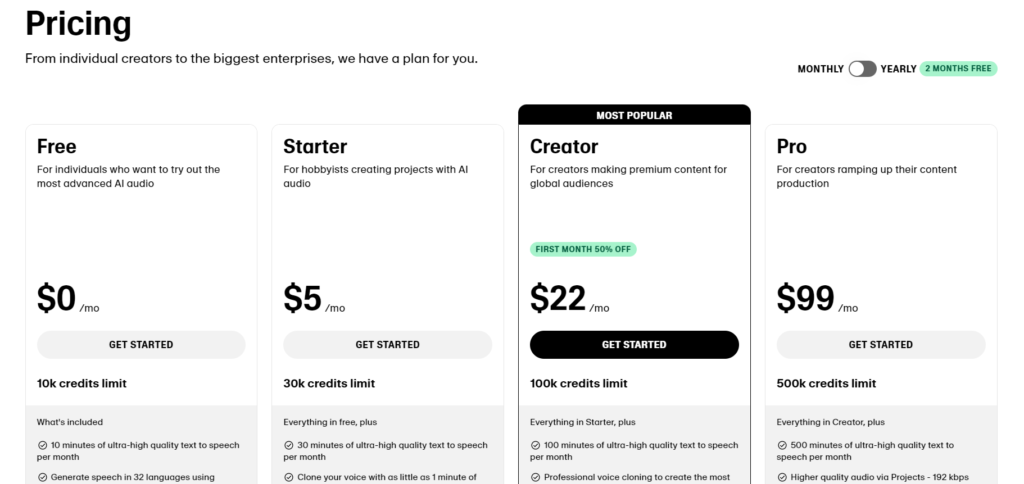
Conclusion of this tool
ElevenLabs is formidably positioned in the domain of synthetic voice generation, offering powerful tools that can enhance creative projects, improve accessibility, and open up new possibilities in human-computer interaction. Users interested in employing this technology should consider the ethical implications, particularly regarding voice cloning, and seek the most current information on pricing and capabilities to ensure it meets their requirements. With responsible use, ElevenLabs and similar technologies have the potential to significantly impact how we produce and interact with audio content.
FAQS
What is ElevenLabs?
ElevenLabs is a cutting-edge AI technology platform specializing in voice generation and cloning, enabling the creation of realistic synthetic voices.
How does voice cloning work?
Voice cloning with ElevenLabs involves analyzing a small sample of someone’s voice, then using AI to reproduce that voice with new speech content that the original speaker did not say.
Can anyone use ElevenLabs?
Yes, ElevenLabs is accessible to content creators, businesses, and developers, but users should consider ethical implications and obtain consent for voice cloning.
Is ElevenLabs free?
Typically, advanced AI services like ElevenLabs offer various pricing models, which may include free trial options. For up-to-date details, contact ElevenLabs directly.
How can ElevenLabs be used?
Applications include creating audio content, enhancing accessibility through voice synthesis, entertainment purposes, and more innovative fields.
Is it legal to clone someone’s voice?
While technology allows voice cloning, its legal and ethical use requires consent from the individual whose voice is being cloned.
How to get started with ElevenLabs?
To start using ElevenLabs, visit their official website, sign up for an account, and check if there are any free trials or demos available.




Leave a Reply